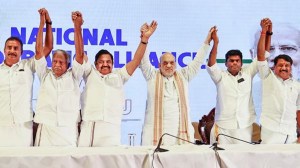Govt set for Star Wars over its ex-staff working for Murdoch
NEW DELHI, AUG 17: The Government is preparing for a showdown with Star TV whose controversial bureaucrat-turned-CEO, Rathi Kant Basu, has ...

NEW DELHI, AUG 17: The Government is preparing for a showdown with Star TV whose controversial bureaucrat-turned-CEO, Rathi Kant Basu, has been ordered to quit for not seeking mandatory official clearance for his post-retirement job with the Murdoch Company.
Around a dozen other former government servants who followed Basu to Star TV will be served similar orders in due course, official sources said today.
They include former Additional Director Information amp; Broadcasting G Guha, former Additional Secretary in the Cabinet Secretariat read RAW Bimla Bhalla, ex-DDGs Doordarshan Urmila Gupta and Indira Mansingh and former Additional Secretary in the Department of Telecommunications Som Chaturvedi.
The Government stupor over the 8220;exodus8221; to Star TV appears to have been broken by the appointments of Guha and Bhalla, both of whom were in sensitive intelligence departments before quitting. While Bhalla joined the Bombay office of the company, Guha was appointed to do liaison work for Star.
The appointments rang alarm bells in government circles and after lengthy deliberations between the Cabinet Secretariat, the Ministry of Personnel, the PMO and the Law Ministry, Prime Minister I K Gujral as Personnel Minister gave the go-ahead last week to proceed against Star TV and its employees from the bureaucracy.
A six-page letter sent by the Ministry of Personnel to Basu is believed to have thrown the rule book at him and warned him of action for defying service rules which require a retiring government servant to seek permission before taking up a job with a private company within two years of retirement.
Basu had earlier sought to wriggle out of this provision by giving up his pension and gratuity benefits. However, the Government has warned him that he is still liable for action unless he resigns from Star.
A separate letter has been sent to News Television India which runs Star TV here stating that Basu8217;s appointment goes against government procedures.
Both Basu and Star have been given 15 days to comply with the Government8217;s orders for his resignation.
Although strictly speaking, the Government may find it difficult to take legal action against them as breaking service rules is not a criminal offense, official sources said there are other ways of moving against persons and organisations which defy the system.
One would be to ostracise Star and its high-flying former bureaucrats by declaring them persona-non-grata in government offices. In fact, one of the steps being contemplated by the Government is to issue a circular to all concerned departments to stop dealing with the company and its officers.
Star officials refused to comment on the development. Urmila Gupta, who is Executive Director DTH in the company said that no such letter has been received by either Basu or NTV as yet. 8220;It may have been sent to Bombay. We can comment only after we see what is in the letter, if such a letter exists,8221; she stated.
A senior Star official who preferred to remain anonymous, however, described the Government8217;s action as 8220;persecution8221; and maintained that a section of the IAS was acting 8220;out of pique8221;. He said that the Government and Doordarshan were scared of competition from private channels and this was their way of hitting back.
Some media critics agree. 8220;Some time ago, a secretary in the Petroleum Ministry quit to join Reliance. Although the conflict of interest was evident, the government did not take any action against him,8221; said a media observer.
Official circles cite the case of T R Takkar, former Secretary Telecommunications, later Electronics, to bolster the case against Basu. Takkar asked for government permission to join the Cellular Operators Association of India as Secretary General after he retired.
The Government refused on the grounds that Takkar had dealt with the companies which were members of the Association in his capacity as Secretary. Several letters were exchanged but ultimately, Takkar gave in and resigned from his new job.
The Government8217;s main anxiety seems to be the kind of access former bureaucrats have in the corridors of power. The single-minded pursuit of government servants by Star under Basu has aroused fears that the MNC is more interested in 8220;infiltrating8221; the bureaucracy than in the technical qualifications of the persons it has hired.
Official sources said the ball is now in Star TV8217;s court. Murdoch and his advisors will have to decide whether they want to battle it out with the Government of India. The next stage of the battle will depend on Star8217;s response to the first salvo fired by the Government.
Point: Government
Star8217;s motive is suspect. Senior officials from intelligence agencies have been recruited.
There is a clear conflict of interest. Most of the officials hired worked with ministries dealing with media and communication.
With the entry of MNCs it is necessary to strengthen code of conduct. Measures such as denial of pension fail in the face of high MNC salaries and added perks that go with.
Counterpoint: Star TV
Government8217;s move smack of vendetta amp; follows a pattern which began with the DTH ban.
We have not broken any rules. Unable to compete on quality, government officials are misusing power to harass Star which they see as a rival.
Why has the government taken more than a year, after Basu joined Star, to act? Why hasn8217;t it acted against other officials who joined companies which their former departments dealt with?
- 01
- 02
- 03
- 04
- 05































